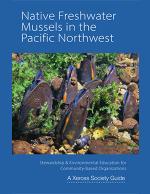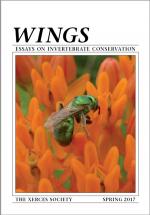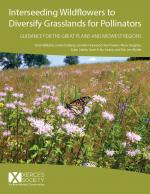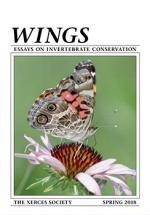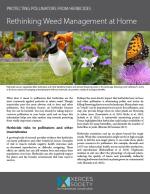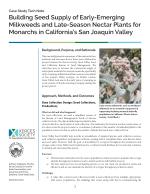As a science-based organization, the Xerces Society produces dozens of publications annually, all of which employ the best available research to guide effective conservation efforts. Our publications range from guidelines for land managers, to brochures offering overviews of key concepts related to invertebrate conservation, from books about supporting pollinators in farmland, to region-specific plant lists. We hope that whatever you are seeking—whether it's guidance on making a home or community garden pollinator-friendly, advice on developing a local pesticide reduction strategy, or detailed information on restoring habitat—you will find it here!
Find Publications
Use the search functions to sort by publication type (books, guidelines, fact sheets, etc.), location, and/or subject (agriculture, gardens, pollinators, pesticides, etc.).
Stewardship and Environmental Education for Community-based Organizations
Conducting research with trained volunteers (citizen scientists) is an increasingly popular and successful model for gathering data while increasing public science education and connecting people with nature where they live and play. Xerces has used this model to develop effective protocols for volunteer-based mussel surveys. Our work has helped address existing gaps in capacity and education, but there are many opportunities to work with new partners in additional watersheds and across cultures. Native Freshwater Mussels in the Pacific Northwest is a guide to help those organizations in their restoration and conservation work.
2nd edition
This guide was a project of the Pacific Northwest Native Freshwater Mussel Workgroup, a consortium of individuals from state and federal agencies, private businesses and nonprofits that aims to conserve freshwater mussels by ensuring that research, management, and educational activities are coordinated, prioritized, and consistent with identified information needs.
Essays on Invertebrate Conservation
What happens on farmland affects the health of wildlife, and changing how agricultural lands are managed can have a broad and profound influence on populations of bees, butterflies, and a host of other animals.
This article from the Fall 2012 issue of Wings Magazine explores the effects of neonicotinoid pesticides in gardens.
Land managers and land owners can bring wildflowers back to low diversity, established grass stands through a process known as interseeding. This publication provides guidelines and specific strategies for interseeding wildflowers into established grasslands and identifies species of wildflowers most likely to establish and persist in the Midwest and Great Plains.
Essays on Invertebrate Conservation
Grasslands are among the most threatened habitats; easy to build upon or plow up, they are often the first to go. This issue of Wings looks at the beautiful wildlife that grasslands support, and some of the management problems faced by conservationists.
Essays on Invertebrate Conservation
Our Fall 2009 issue of Wings Magazine looks at conservation efforts targeted at other species that also benefit invertebrates in the same ecosystems.
An annual report of the Xerces Society's Pollinator Conservation Program’s conservation efforts.
An annual report of the Xerces Society's Pollinator Conservation Program’s conservation efforts.
An annual report of the Pollinator Program’s conservation efforts.

